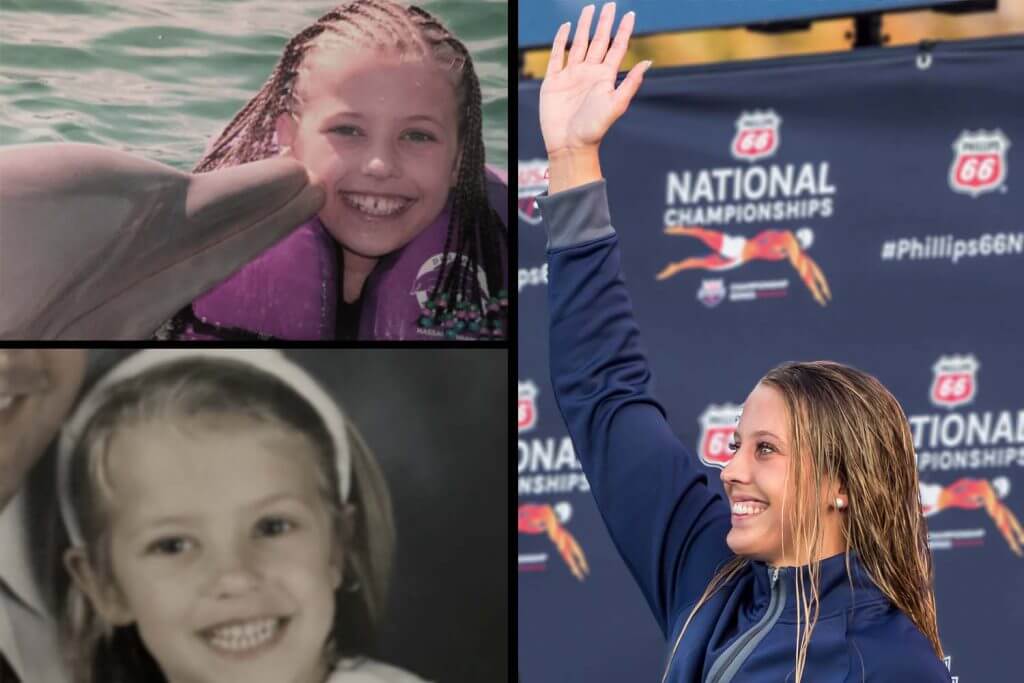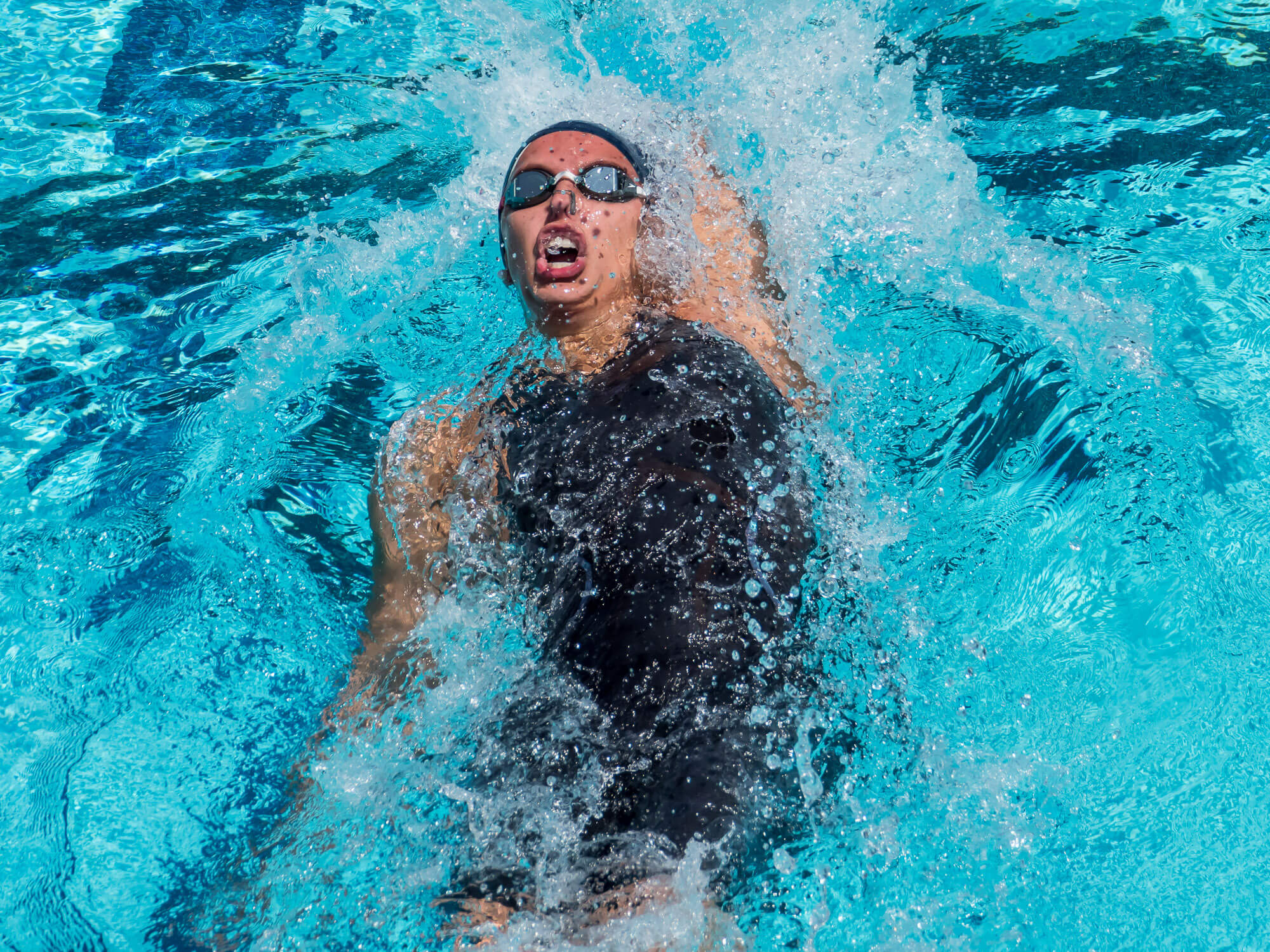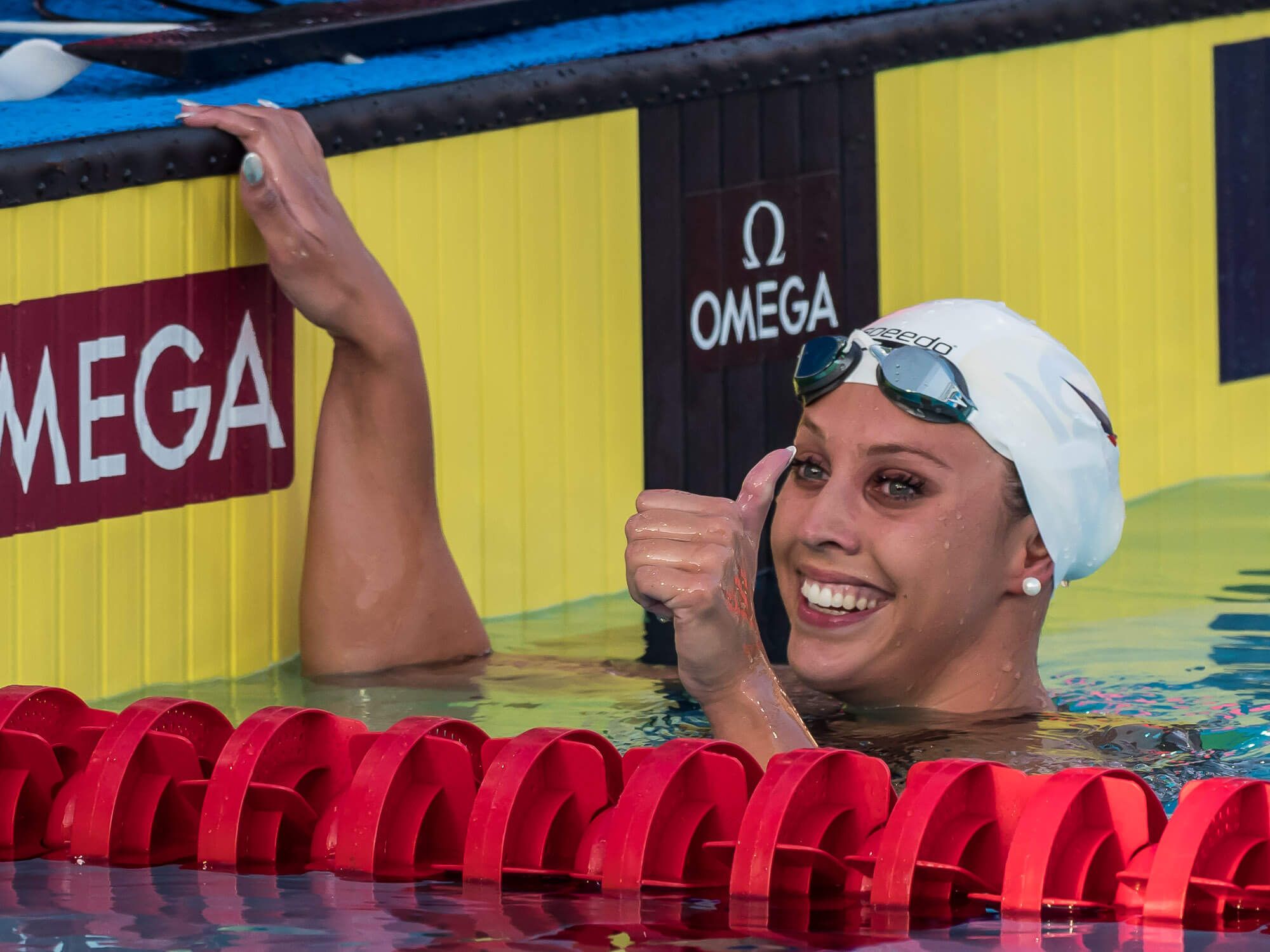Six More Tidbits on New World Record-Holder Kathleen Baker

By David Rieder.
This month’s cover of Swimming World Magazine features Kathleen Baker, with an image captured just moments after Baker set the first world record of her career in the 100 back at U.S. Nationals. Inside, you can read about Baker’s relationship with swimming, her Olympic experience, her reasons for turning pro, her battle with Crohn’s disease and, of course, the emotions of setting a world record.
Baker and her parents, Norris and Kimberley, each gave so much insight into the mind of this 21-year-old backstroker—too much, in fact, to fit inside the magazine. So read below for more tidbits about Baker, and download the October magazine to read the full story.
1. Baker considers her older swimmer, former Washington and Lee swimmer Rachel, “my best friend and biggest support system.”
When Rachel and Kathleen were growing up, their swimming friends couldn’t help but noticing how the younger sibling had surpassed the older one in the pool.
“People said, ‘I can’t believe your little sister is faster than you,’” Norris recalled. “Rachel’s line was, ‘Yeah, and she’s faster than you, too.’”

Rachel and Kathleen Baker — Photo Courtesy: Baker family
Kimberley explained that built a life and identity outside of swimming, even as she progressed towards a collegiate career of her own. Kathleen added that Rachel was never resentful of her success and in fact respected how much Kathleen had to give up to pursue her goals in swimming.
And as Kathleen pursued those goals, Rachel would be there for her sister. Kimberley remembered how, at Olympic Trials in 2016, “Rachel practically had to leave the building when Kathleen swam because she was so shaken by it.”
After she graduated in 2017 and got a real-world job, Rachel could not miss work to watch Kathleen swim at either the 2017 World Championships, where Kathleen won three medals, or at this year’s Nationals, where Kathleen broke the world record. Bummed to have missed out, Rachel took her last vacation days of the year to come to Tokyo for the Pan Pacific Championships.
“That’s something that I don’t think every sibling would do,” Kathleen said. “She’s the first person to text me after my race, the first person to be happy for me. I hope I can support her the same way, even though our lives are so different at this point because I’m swimming still and she has a real job. I’m equally as happy for her successes, and it’s just so exciting to have a sister that you’re so close with.”
2. Baker possesses enormous self-belief.
When dealing with elite athletes, the cream of the crop, you will often find a trait or two that sets them apart from mortals. For Kathleen Baker, it’s self-belief—refusing to acknowledge that things might not work out in her favor, even if odds are against her being successful.
When Baker was diagnosed with Crohn’s as a young teenager, there was no precedent for an athlete overcoming a condition like that to become an Olympic medalist in swimming. Her parents, Norris and Kimberley, forced themselves to have a positive attitude and intentionally surrounded Kathleen with doctors who would be supportive and believe in her. But the attitudes of those around her was not why Baker so strongly believed in herself.
“I just think Kathleen is unique and special in her ability to—I don’t know how to put this into words,” Kimberley paused, and Norris continued her thought.
“Kathleen is always very positive about what she can put her mind to and accomplish,” Norris said. “She always believed that she could do it. She said, ‘I want to accomplish these things,’ and she would just keep going.’”
3. Baker knows she can’t go overboard in training.
Even now that Baker knows how to manage her Crohn’s daily—she gives herself shots daily and takes extra care to eat healthy and get plenty of sleep—there are still limits to what she can and can’t do in training. She can’t swim double workouts every day, even if she would really like to.
Growing up, it took time for Baker to accept that given her condition, she simply could not put in as much work volume as her peers.

Photo Courtesy: Peter H. Bick
“I think biggest one of the things that’s helped Kathleen is getting better at knowing her limitations with training. It took a pretty long time for that to sink in, and I would say that’s maybe held her back career wise,” Kimberley said. “She wanted to do everything that everybody else was doing and more and no matter what—no matter if she was sick or not.”
Baker admits that even now, it’s difficult for her to tell her coaches, David Marsh at Team Elite and Teri McKeever at Cal, that she doesn’t feel right and she can’t do something in practice. She explained that she either feels good or she doesn’t—without much grey area in between.
“Luckily, Teri has known me for years, and Coach Marsh known me for so long,” she said. “They will say you can see it in my eyes when I’m not doing well. They say, ‘How are you doing?’ and if I don’t answer, then they know it’s not a good day. Instead of doing a killer practice, maybe I’ll do something aerobic.”
4. Baker’s racing strategy has evolved—but she still goes out really fast.
All her life, Baker’s M/O has been go out hard and hang on—or not. In the biggest races of her life, like the Olympic final or when she broke the world record at Nationals, she has gone out hard, and every time, that leaves her parents praying that she will have enough left in the tank to hang on. Some swimmers enjoy chasing down their competition at the end of a race, but not Baker.
“That’s been the way she has been swimming since she started racing,” Norris said. “Her belief—which is now kind of true—has been, ‘I’m going to keep going out fast and eventually I’m going to be older and bigger and stronger and I’m going to keep holding it.’”
But Baker insists that even when she blows the doors off on the first 50 meters—like when she split 27.90 on her way to the world record at Nationals—she’s actually holding something back. Her new strategy is what she calls “an age group style and trying to make it a little bit more professional now.”
“I definitely have to reign that in a little bit or else I won’t be able to finish the last 15 meters. That’s something that I’ve sort of learned,” Baker said. “I think for me, it’s just been something that I’ve done my whole life, and I don’t have the fear of pain at the end. I know it’s going to hurt, and I embrace that.”
5. Baker is embracing the 100 back-200 IM double at the World Championships.

Photo Courtesy: Peter H. Bick
For the first time at next summer’s World Championships, Baker will race the 200 IM at a global meet. And that’s a surprise—not that she qualified for the event but that she is choosing to take it on. In the event schedule for the World Championships, the 100 back semi-finals will occur right before the 200 IM final, with only the men’s 200 free semi-finals in between.
That scheduling conflict has deterred many swimmers more accomplished than Baker, including Katinka Hosszu. Hosszu won Olympic gold in the 100 back in 2016—one spot ahead of Baker—but she pulled out of the event after prelims at both the 2015 and 2017 World Championships to concentrate on the 200 IM final.
Baker admits that the timing of the events is not ideal, but she thinks her years in college swimming have prepared her adequately for such a double. And she plans to focus on that back-to-back all year in training.
“This is an opportunity for me,” Baker said. “This year, I’m really going to focus on that double. because I feel like there’s so much potential left in the 200 IM.”
6. The advice Baker would give to a young swimmer.
“I just think it’s really important to trust the process. I never burst onto the scene as a swimmer—I sort of hit every single one of USA Swimming’s gradual notches along the way. I just worked as hard as I can to get there. I’m 21 years old, and I’m still going massive best times, which is so exciting.
“A lot of that has to do with believing in yourself and having fun. There’s not a day when I go to practice and it’s not something fun that I’m looking forward to. I think that’s what helps swimmers succeed so much, that they’re really enjoying what they’re doing.
“Believing in yourself along the way is something that I’ve really had to have in my life because without believing in yourself, it’s really hard to overcome adversity. It doesn’t have to be a chronic illness—it can be a shoulder injury or a broken foot or something that like or just being at a plateau.
“I think it’s just important to always have that confidence and belief in yourself that things will end up okay and you’ll be able to accomplish your goals with hard work and determination and just being able to enjoy it.”




Good for her.